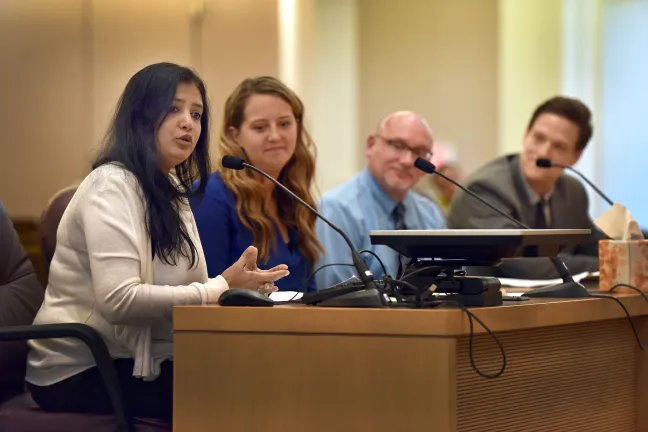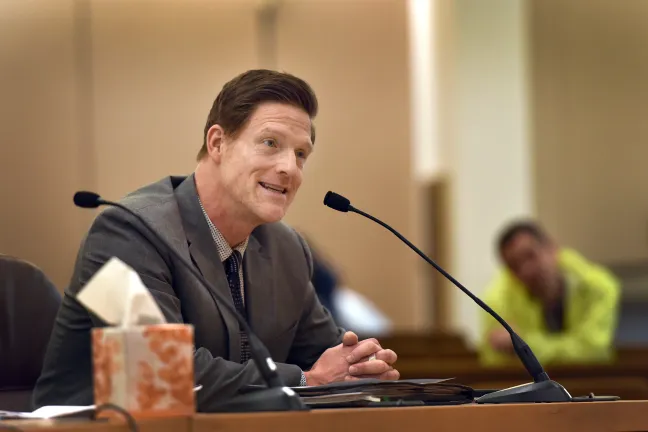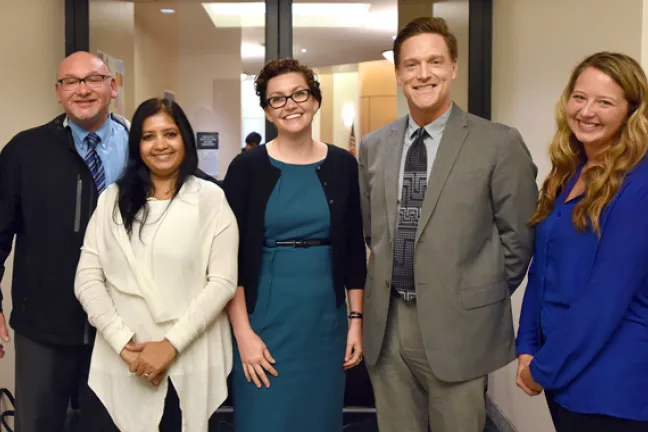The Multnomah County Board of Commissioners officially proclaimed May as Mental Health Month at this week’s regular board meeting.
David Hidalgo, director of the Mental Health and Addiction Services kicked off the presentation by stressing the importance of destigmatizing mental illness.
“As we know, mental health -- like any other health condition -- is one that any human, any individual in our community can experience,” said Hidalgo. “The research tells us that in any given point in a year, one in five individuals in our community will experience a mental health condition.”
Asha Khanvilkar, whose son participates in the county’s Multnomah Early Assessment and Support Alliance, told the board how Multnomah County has had a positive impact on her family.
The Multnomah Early Assessment and Support Alliance -- or EASA for short -- is a program that supports young adults ages 15 to 25 who have recently experienced their first episode of psychosis.
Before getting connected to EASA , Khanvilkar said she had a hard time accepting that her son might be suffering from mental illness. For a time, she tried to attribute his suffering to teen angst. “It takes time to accept that something different is happening...You ignore,” she explained. “Then you see the whole family change. The whole house feels sick. The family feels sick.”
Thanks to the support Khanvilkar’s son received from EASA, she says he’s now happy and healthy. “Going to EASA, we realized that there is a solution to your problem and it is being taken care of,” she said.
Her one regret? That she hadn’t heard about the program sooner. “If only I had this information earlier, could I have avoided this situation?” Khanvilkar wondered.
Vicky Scott, a peer mentor with the county’s Mental Health and Addiction Services’ Youth Move program also shared her story at the May 14 board meeting.
“‘Vicky, you cannot pray away chemical imbalance,’” Scott repeated to the Board of Commissioners what she was once told by a college advisor. “‘You are not defined by your diagnosis, though it feels paralyzing and suffocating.’”
As she’s worked with young people and families to overcome obstacles brought on by mental illness, Scott says it has become apparent that recovery is “where the magic happens.”
“Mental illness is just that. An illness. Something that can be treated,” she said.
Neal Rotman, community mental health program manager with the Mental Health and Addiction Services Division, praised the board for its ongoing support, including initiatives that “provide crisis supports, culturally-specific treatment services...mental health treatment services from childhood to our older adult population."
Rotman also told the board about the division’s newest initiative, a behavioral health prevention coordinator whose job it is make sure that the county is offering trainings to “educate and prepare our community in the area of mental health first aid and suicide prevention.”
Taking on that role is Mandy Kubisch. Kubisch, also present at the board meeting, said the county has trained people all across the community in mental health first aid.
Members of the community include parents, grandparents, faith-based organizations, programs serving people experiencing homelessness, health clinics, SUN Schools and several local school districts.
But the training doesn’t stop with community members, Kubish explained. Multnomah County is training more trainers.
Suicide intervention skill training is being given to Multnomah County’s Department of Community Justice and the Health Department so “that they can train within their own departments and community networks,” Kubish said.
To increase the availability of these trainings, Multnomah County has joined forces with Clackamas and Washington counties to launch a website called Gettrainedtohelp.com. There, any interested resident in the tri-county region can sign up for a free mental health first aid training in their area.
“Prevention works,” said Hidalgo before the Mental Health Month proclamation was read aloud. “Mental health treatment is effective. And recovery is possible, and in fact, expected.”
Resources
● If you or someone you know is suffering from a mental health crisis, please call the Multnomah County Health Crisis Line at 503-988-4888.
● Learn more about Multnomah County Mental Health and Addiction Services



